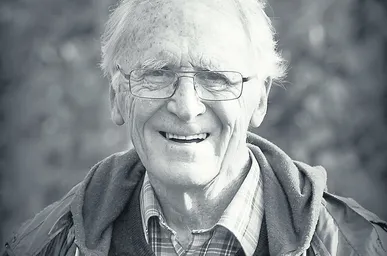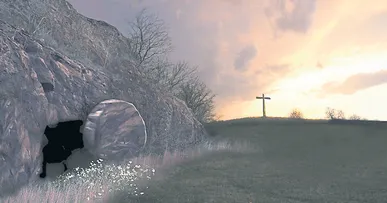
Evangelicalism in crisis
Ranald Macaulay
Date posted: 1 Jun 2018
Mary Davis interviews Ranald Macaulay for en
Ranald Macaulay studied Law at Cambridge University.

Darwin undeniably discredited
Ranald Macaulay
Date posted: 1 Oct 2016
Ranald Macaulay introduces us to a very significant book
My admittedly dramatic title is deliberate.

Lausanne & the polemical imperative
Ranald Macaulay
Date posted: 1 Mar 2016
Ranald Macaulay asks if the 1974 Congress missed something vital
When the Lausanne Congress opened in 1974 the global community was being treated to searing images of the Ethiopian famine.
Reflecting on the Olympics
Ranald Macaulay
Date posted: 1 Oct 2008
A chill swept through me as I read Charles Moore’s recent article on the Beijing games1.
Media images of hard, cruel-faced bodyguards accompanying the Olympic torch around the world now slotted into place. ‘As the choice of Berlin for the Olympic Games in 1936 marked Hitler’s success and international acceptance, so the choice of Beijing for 2009 marks China’s’. In other words the global community was being treated to a massive con exercise. An emblem of peace masks a system of despotism.
Learning from Francis Schaeffer
Ranald Macaulay
Date posted: 1 Jan 2008
At the risk of oversimplification, Francis Schaeffer’s vision can be expressed in two fundamental concerns:
* True truth
* True spirituality
Born in the German town section of Philadelphia in 1912, as a young man he came in contact with the Christian faith in an almost unique way. During his late teens he happened to be reading classical philosophy. This showed him (a) that he had found the field of interest in which he felt most at home, ideas; and (b) that philosophy had no answers despite the fact that it dealt with what he called later ‘the basic philosophic questions’. Plenty of questions, but no answers!
Rescuing Darwin or wrecking the faith
Ranald Macaulay
Date posted: 1 Nov 2008
I was weaned from Darwinian evolution completely by surprise.
Converted my first weekend at university back in 1956 I found I had an immediate love of the Bible and a thirst to read more. At the same time I remained sceptical about origins. ‘Yes’ I said to my friend, ‘I do believe the Bible to be true, but don’t think I’m going to accept the Genesis myths uncritically!’ Like practically everyone today I had been raised to think that evolution was unquestionable — hence my problems about Adam and Eve.
Reaction and distraction
Ranald Macaulay
Date posted: 1 Jul 2008
When Marian Evans’s novel Adam Bede came out in 1859 it made the name ‘George Eliot’ justly famous.
Her novels soon took their place among the finest in the English language. To discerning readers, however, Marian’s scepticism indicated a growing problem about Christianity and the church.
Living in Sodom
Ranald Macaulay
Date posted: 1 Jun 2006
The fact that we find ourselves living in Sodom should come as no surprise.
Almost a century ago to the day (April 8 1906), Lytton Strachey of Trinity College, Cambridge, wrote to Maynard Keynes, the future economist, ‘We can’t be content with telling the truth — we must tell the whole truth: and the whole truth is the Devil… It’s madness for us to dream of making dowagers understand that feelings are good, when we say in the same breath that the best ones are sodomitical … our time will come a 100 years hence.’
As implausible as Father Christmas?
Ranald Macaulay
Date posted: 1 Dec 2006
The Bible emphasises that its truth is never readily accepted by the human heart.
It therefore prepares us not just for physical opposition but also for varying degrees of intellectual misunderstanding and even incredulity. When Paul addresses the Athenians, they object that he is bringing them ‘strange ideas’. The same would doubtless have been true had he been preaching in India or China, America or Egypt. Having said that, it is at least arguable that a new type of incomprehension has taken hold in Europe since the 18th century and that this new mindset is almost unique in history.
They believed God!
Ranald Macaulay
Date posted: 1 Mar 2005
Was it coincidence that brought Francis and Edith Schaeffer to their home in the Swiss Alps on an April Fools Day? Or was it another of God's subtle ironies pointing ahead to the essence of their future work?
Was God, in other words, as so often in history, choosing the foolish and weak things of the world to shame the wise and strong?
Who needs it?
Ranald Macaulay
Date posted: 1 Dec 1998
Despite the recent post-modernist revolt, Western culture still labours under much of the mythological residue left over from the Enlightenment. The axiom, for example, that religion is unimportant and irrelevant still survives.
Society should be redesigned along secular lines. Substitution of a materialistic for a religious worldview would leave morality unaffected and economic prosperity and political peace to thrive. It would simply be a case of being more practical - more tolerant, more progressive, less superstitious.
Inerrancy - the larger discussion (Bulldog for March)
Ranald Macaulay
Date posted: 1 Mar 1997
Christianity has always recognised two basic 'impossibilities': the impossibility of unaided human salvation and the impossibility of unaided human knowledge. Paul says: 'no one will be declared righteous . . . by observing the law' and again, 'the world in its wisdom did not know God'.
As evangelicals we are familiar with the first, less with the second - which is serious not only for the inerrancy debate, but also for our whole experience, for the central issue of our time is not soteriology (salvation), important and necessary as that remains, but epistemology (knowledge). The West's current disorientation and distress flows naturally from its intellectual bankruptcy.